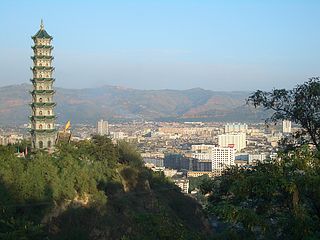Year 129 BC was a year of the pre-Julian Roman calendar. At the time it was known as the Year of the Consulship of Tuditanus and Aquillius and the Sixth Year of Yuanguang. The denomination 129 BC for this year has been used since the early medieval period, when the Anno Domini calendar era became the prevalent method in Europe for naming years.

Bactria, or Bactriana, was an ancient Iranian civilization in Central Asia based in the area south of the Oxus River and north of the mountains of the Hindu Kush, an area within the north of modern Afghanistan. Bactria was strategically located south of Sogdia and the western part of the Pamir Mountains. The extensive mountain ranges acted as protective "walls" on three sides, with the Pamir on the north and the Hindu Kush on south forming a junction with the Karakoram range towards the east.
This article concerns the period 129 BC – 120 BC.
Year 126 BC was a year of the pre-Julian Roman calendar. At the time it was known as the Year of the Consulship of Lepidus and Orestes and the Third Year of Yuanshuo. The denomination 126 BC for this year has been used since the early medieval period, when the Anno Domini calendar era became the prevalent method in Europe for naming years.

The Yuezhi (Chinese: 月氏; pinyin: Yuèzhī, Ròuzhī or Rùzhī; Wade–Giles: Yüeh4-chih1, Jou4-chih1 or Ju4-chih1;) were an ancient people first described in Chinese histories as nomadic pastoralists living in an arid grassland area in the western part of the modern Chinese province of Gansu, during the 1st millennium BC. After a major defeat at the hands of the Xiongnu in 176 BC, the Yuezhi split into two groups migrating in different directions: the Greater Yuezhi (Dà Yuèzhī 大月氏) and Lesser Yuezhi (Xiǎo Yuèzhī 小月氏). This started a complex domino effect that radiated in all directions and, in the process, set the course of history for much of Asia for centuries to come.

Zhang Qian was a Chinese diplomat, explorer, and politician who served as an imperial envoy to the world outside of China in the late 2nd century BC during the Western Han dynasty. He was one of the first official diplomats to bring back valuable information about Central Asia, including the Greco-Bactrian remains of the Macedonian Empire as well as the Parthian Empire, to the Han dynasty imperial court, then ruled by Emperor Wu of Han.

Balkh is one of the 34 provinces of Afghanistan, located in the north of the country. It is divided into 15 districts and has a population of about 1,509,183, which is multi-ethnic and mostly a Persian-speaking society. The city of Mazar-i-Sharif serves as the capital of the province. The Mawlana Jalaluddin Mohammad Balkhi International Airport and Camp Marmal sit on the eastern edge of Mazar-i-Sharif.

Antimachus I Theos was one of the Greco-Bactrian kings, generally dated from around 185 BC to 170 BC.

Dayuan is the Chinese exonym for a country that existed in Ferghana valley in Central Asia, described in the Chinese historical works of Records of the Grand Historian and the Book of Han. It is mentioned in the accounts of the Chinese explorer Zhang Qian in 130 BCE and the numerous embassies that followed him into Central Asia. The country of Dayuan is generally accepted as relating to the Ferghana Valley, controlled by the Hellenistic city-state Alexandria Eschate, which can probably be understood as "Greco-Fergana city-state" in English language.

Daxia, Ta-Hsia, or Ta-Hia was apparently the name given in antiquity by the Han Chinese to Tukhara or Tokhara: the main part of Bactria, in what is now northern Afghanistan, and parts of southern Tajikistan and Uzbekistan.

Xiahe County is a county in Gannan Tibetan Autonomous Prefecture, Gansu province, China, bordering Qinghai province to the west. The name, which literally means "Xia River", refers to the Daxia River which runs through the county. It is home to the famed Labrang Tibetan Buddhist monastery, one of the largest Tibetan Buddhist monasteries outside the Tibet Autonomous Region. The town is populated largely by ethnic Tibetans, as well as some Hui and Han Chinese. The area is highly rural and pastoral. The geography is mountainous. In recent years it has become a tourist attraction. The county was named Xiahe in 1928, after the Daxia River that flows through its territory.

Linxia City, once known as Hezhou, is a county-level city in the province of Gansu, China and the capital of the multi-ethnic Linxia Hui Autonomous Prefecture. It is located in the valley of the Daxia River, 150 km (93 mi) southwest of the provincial capital Lanzhou.
The Dunhong Mountain, according to Classic of Mountains and Seas, is a mountain of the Tian Shan range.

The Greco-Bactrian Kingdom was a Greek state of the Hellenistic period located in Central Asia. Along with the Indo-Greek Kingdom in the Indian subcontinent, it was the easternmost part of the Hellenistic world. The kingdom was founded c. 256 BC by the Seleucid satrap Diodotus I Soter and lasted until its fall c. 120 BC. It was ruled by the Diodotid dynasty, Euthydemid dynasty, and the Eucratid Dynasty.
Bactria was an ancient region of Central Asia centred on the city of Balk (Bactra) in present-day Afghanistan.
This page is based on this
Wikipedia article Text is available under the
CC BY-SA 4.0 license; additional terms may apply.
Images, videos and audio are available under their respective licenses.









